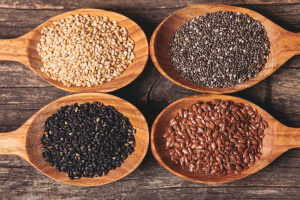Healthy Gut May Reduce Breast Cancer

Breast cancer remains a formidable health challenge for women. In fact, breast cancer is the most common cancer in women in the United States, except for skin cancers. It is about 30% (or 1 in 3) of all new female cancers each year.
There is ongoing research into preventive measures and protective factors. One promising area of research involves gut health and how lignans, naturally occurring compounds found in plant-based foods, can have positive effects on reducing breast cancer risk. A new study demonstrates that the human gut microbiome may be a factor in breast health.
Lignans and Breast Cancer
Lignans, classified as polyphenolic compounds, are widely distributed in seeds, whole grains, fruits, and vegetables. Research suggests that lignans may exhibit protective effects against breast cancer through multiple mechanisms, including their influence on hormonal balance and antioxidant properties.
Gut Microbiota and Health
The gut microbiota, a diverse community of microorganisms residing in the digestive tract, plays a crucial role in maintaining overall health. It contributes to nutrient absorption, immune system regulation, and protection against harmful pathogens. Disruptions in the balance of gut microbiota have been linked to various health issues, including cancer.
Positive Impact of Lignans on Gut Microbiota
Prebiotic properties of lignans: Lignans function as prebiotics, promoting the growth and activity of beneficial bacteria in the gut. The microbial fermentation of lignans results in the production of enterolignans, such as enterodiol and enterolactone, which have been associated with improved gut health.
Microbial fermentation and SCFA production: The breakdown of lignans by gut bacteria produces short-chain fatty acids (SCFAs), including butyrate, acetate, and propionate. SCFAs are known for their anti-inflammatory properties and play a crucial role in maintaining a healthy gut environment.
Balancing microbial composition: Studies have shown that lignan consumption can positively influence the composition of gut microbiota, increasing the abundance of beneficial bacteria. A balanced and diverse microbial community is associated with reduced inflammation and improved overall health.
Breast Cancer Protection Through Gut Health
Anti-estrogenic effects: Lignans may help protect against hormone-dependent breast cancers by exerting anti-estrogenic effects. By influencing the gut microbiota, lignans contribute to the metabolism of phytoestrogens, helping to balance hormonal levels.
Anti-inflammatory effects: A well-balanced gut microbiota, influenced by lignans, contributes to an anti-inflammatory environment. Chronic inflammation is a known factor in cancer development, and a reduced inflammatory state may lower the risk of breast cancer.
How to Add Lignans to Your Diet
Flaxseeds: Flaxseeds are one of the richest sources of lignans. You can add ground flaxseeds to your cereal, yogurt, smoothies, or salads. Keep in mind that flaxseeds should be ground to release their nutrients, as whole flaxseeds may pass through your digestive system undigested.
Sesame seeds: Sesame seeds are another good source of lignans. Sprinkle sesame seeds on salads, stir-fries, or yogurt. You can also use tahini, a paste made from sesame seeds, in dressings or as a spread.
Whole grains: Whole grains like barley, oats, rye, and wheat contain lignans. Choose whole grain bread, pasta, and cereals to increase your lignan intake.
Vegetables: Certain vegetables, such as broccoli, cauliflower, cabbage, Brussels sprouts, kale, and spinach, contain lignans. Including a variety of vegetables in your diet can contribute to your overall lignan intake.
Berries: Berries, especially strawberries and raspberries, contain lignans. Add them to your breakfast, snacks, or as a topping for desserts.
Herbs and spices: Herbs and spices like thyme, oregano, and cinnamon also contain lignans. Use them in your cooking to enhance flavor and increase lignan intake.
Legumes: Foods like lentils, chickpeas, and beans contain lignans. Include legumes in soups, stews, salads, or as a side dish.
Nuts: While not as high in lignans as some other sources, nuts like walnuts and almonds can contribute to your overall intake. Snack on a handful of nuts or add them to yogurt and salads.
Green tea: Green tea contains lignans, so consider adding a cup of green tea to your daily routine.
Remember that a balanced and varied diet is the key to obtaining a wide range of nutrients, including lignans. It's also important to note that cooking methods can affect the availability of lignans, and in some cases, soaking or fermenting certain foods may enhance lignan content. If you have specific dietary concerns or health conditions, it's advisable to consult with a healthcare professional, registered dietitian, or nutritionist for personalized advice.
Categories
Categories
Humanized Health - NEW!
Learn about personalized health from top experts! Check out our fascinating new shows every week, available as videos, podcasts and transcripts.:
Our Bloggers
-
 Paula Gallagher
Paula Gallagher
Paula is a highly qualified and experienced nutrition counselor on the staff at Village Green.
read more.. -
 Margo Gladding
Margo Gladding
Margo's impressive knowledge base is the result of a unique blend of educational and professional experience.
read more.. -
 Dr. Neal Barnard
Dr. Neal Barnard
Dr. Barnard leads programs advocating for preventive medicine, good nutrition, and higher ethical standards in research.
read more.. -
 Dr. Joseph Pizzorno
Dr. Joseph Pizzorno
Dr. Joseph Pizzorno, ND is a pioneer of integrative medicine and a leading authority on science-based natural medicine.
read more.. -
 Debi Silber
Debi Silber
Debi is a registered dietitian with a master’s degree in nutrition, a personal trainer, and whole health coach.
read more..
SEE ALL OF OUR BLOGGERS


Village Green Apothecary
5415 W Cedar Ln
Bethesda, Maryland, 20814
(301) 530-0800
Toll Free: (800) 869-9159
The information provided on this site is not intended to be a substitute for advice or treatment from a qualified physician, nor is it intended to diagnose or treat a health problem or disease. Consult your physician prior to starting any new health program or if you any questions regarding a medical condition.
© 2025 Village Green Apothecary - All Rights Reserved.



